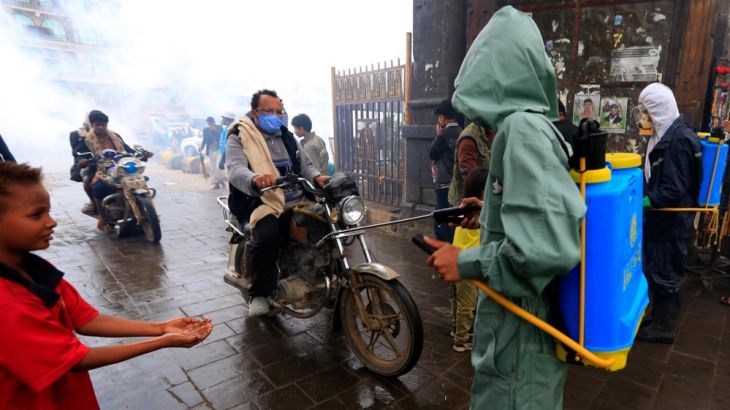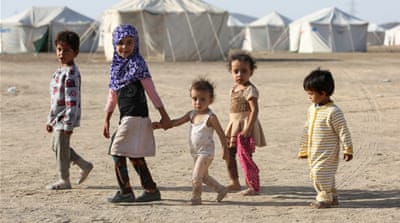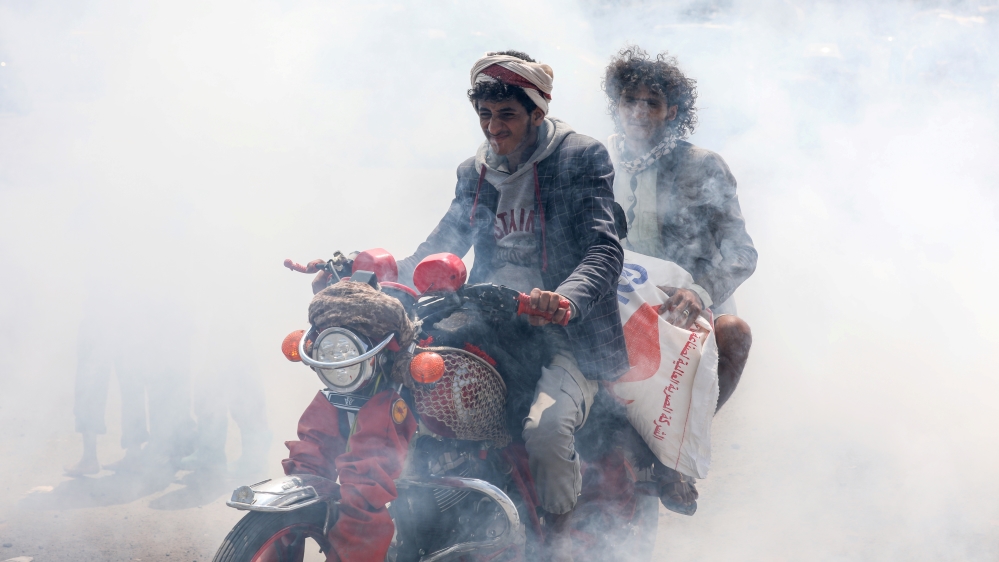Yemen coronavirus cases expected to surge as UN aid dries up
UN warns the death toll from the coronavirus pandemic in Yemen could surpass that from five years of devastating war.

It was inevitable that the global coronavirus pandemic would arrive in Yemen and cross paths with the world’s worst humanitarian crisis. Now that it has, the impact is already showing.
Laila Abdulrab has a front-line seat. A humanitarian aid worker, she has worked for the UNHCR, the UN refugee agency, since 2011. Despite the mass graves being dug in Yemen’s major cities as probable COVID-19 cases increase rapidly, she has continued working, aiding some of Yemen’s most vulnerable.
Keep reading
list of 4 itemsMexico’s teachers seek relief from pandemic-era spike in school robberies
‘A bad chapter’: Tracing the origins of Ecuador’s rise in gang violence
Why is the US economy so resilient?
“I saw and sensed the fear and anxiety [of the refugees and internally displaced people] because of the pandemic and its impact on them and their community,” Abdulrab told Al Jazeera after her last field visit.
“The demand for UNHCR assistance is greater, and without it, many vulnerable people, including single-women households, unaccompanied children, sexual violence survivors and others, will become at serious risk of eviction and a lack of access to food and basic needs.”
‘Overburdened’
Five years of war in Yemen have pitted the internationally recognised government, backed by a Saudi-led coalition, against the Iran-aligned Houthi rebels.
The Middle East’s poorest nation has seen its economy decimated as a result, leaving millions unemployed and 80 percent of the country in need of humanitarian assistance. The coronavirus pandemic only exacerbated the situation.
“Many Yemenis have lost their livelihoods as a result of the pandemic, and the most vulnerable groups in society, such as IDPs and refugees, have become more vulnerable,” Abdulrab said. “The already fragile health system is overburdened and lacks the capacity to keep up with the coronavirus situation.”
|
|
Officially, Yemen’s internationally recognised government has declared more than 900 cases of COVID-19 and more than 250 deaths, while the Houthi rebels in the capital Sanaa have only reported four cases. But the true number is believed to be much higher.
The UN has warned that the death toll from the coronavirus in Yemen could surpass the combined death toll of war, disease, and hunger in Yemen over the last five years – a number estimated at more than 100,000 people.
Depleted funding
The question of funding will perhaps have the biggest effect on humanitarian work in Yemen over the coming months.
At a June 2 virtual donor conference, mainly Arab and Western countries pledged $1.35bn for aid operations in Yemen, far less than the $2.4bn the UN had asked for, and the $3.6bn the UN received last year.
In addition to that, the $1.35bn pledged will not all be going to the UN. Instead, the biggest donor, Saudi Arabia, which has been accused of committing war crimes in Yemen, will channel almost half of the $500m it pledged through its own relief organisations.

The UN has already said more than 30 of the body’s 41 main programmes in Yemen will be ended imminently if additional funding is not found.
“We are not speaking about months, we are speaking about weeks,” Jean-Nicolas Beuze, UNHCR representative in Yemen, told Al Jazeera. “We are going to have to drastically reduce the number of beneficiaries for programmes such as emergency shelters.
“We are going to have to cut 20,000 families from that funding, that means that these people will live in the open, subject to the elements,” said Beuze. “In these conditions, how can they protect themselves from the coronavirus? They cannot.”
Beuze also said the UNHCR would have to cut its cash assistance programme and many of its partnerships with local Yemeni NGOs, leaving 1,500 Yemeni staff without jobs.
International donors’ reduced pledges this year are partly a result of the shocks that have impacted the global economy during the coronavirus pandemic, with neighbouring Gulf Arab countries particularly hit after the price of oil plunged. But Beuze said it was clear there was going to be a funding shortfall even before the pandemic.
“The donors have been concerned about aid diversion, fraudulent use of resources, and that money wasn’t used to support the most vulnerable,” Beuze said. “That was especially in relation to the northern part of the country that is ruled by the Houthis.”

‘No one will be safe’
International bodies, including the World Food Programme, have accused the parties to Yemen’s conflict of stealing aid money, in particular the Houthis. The Houthis have denied the accusations and criticised the role of international NGOs in Yemen.
Humanitarian aid has been caught up in the political machinations of the war in Yemen, with the Saudi-led coalition and its allies, particularly the United States, wary of giving aid to Houthi-run areas.
Osamah al-Rawhani, deputy executive director of the Sana’a Center for Strategic Studies, said pledging decisions have been political as much as they have been economic.
“The US has lost trillions of dollars as a result of the coronavirus, and they have cut their aid to Yemen,” al-Rawhani said. “The question is, is the reduction in funding a result of their economy, or is it a political decision directed towards the Houthis, as they’re perceived to be Iranian allies?”
“I know of a country where officials have told me that they want to provide more aid to Yemen, but they need to wait for their economy to improve,” al-Rawhani added. “Then you have the UAE, which is a different situation – the shift in their funding is less to do with the economy and more to do with political considerations, and where they feel that they want to spend their money in Yemen.”
Those political considerations leave international NGOs in an increasingly difficult position, right at a time when they need help the most as the coronavirus pandemic continues to spread.
“We don’t only need to help Yemen because of ethical or humanitarian imperatives, but also from a self-preservation point of view,” said Beuze.
“It is a country of transit. If we don’t make a country like Yemen – which is one of the weakest links in this global public health battle against the pandemic – safe, then no one will be safe.”